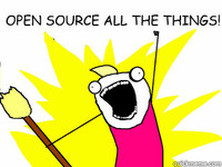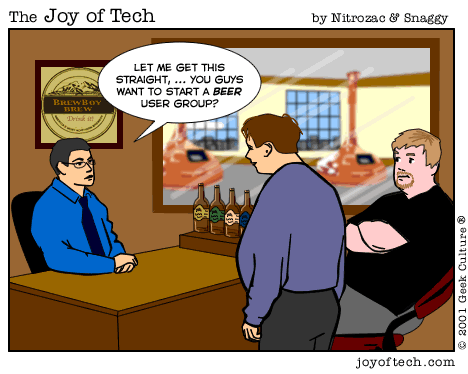
(working through a massive headache this morning, so apologies for any weirdness)
E. Gabriella Coleman's Coding Freedom (2013) provides an ethnography of hacker life that details the intricacies of hackers' relationship to various components of (neo)liberalism. She argues that in order to work against the expansion of intellectual property law, F/OSS programmers use the liberal notion of free speech, thus revealing the tensions in our own political/ethical institutions and supposedly cherished values of the right to protection of private property and thee free expression of ideas.
Two elements of this argument in particular allowed me to have something of a cohesive understanding of how hackers are able to maintain this kind of ethical standard. The first element is the breakdown of hackers' understanding of code as speech. Coleman demonstrates how hackers define "free" in various ways -- from the "free to consume" sort of free (free beer) to "free to edit and share" (free speech). According to Coleman, hackers consider code to be speech because of the "difficulty of drawing a sharp line between functionality and expression in software” (174). She quotes extensively from Seth Schoen's decryption poem (which serves as a translation or "re-creation of the original DeCSS decryption software programmed by Johansen) to show his understanding of exactly how code is speech:
E. Gabriella Coleman's Coding Freedom (2013) provides an ethnography of hacker life that details the intricacies of hackers' relationship to various components of (neo)liberalism. She argues that in order to work against the expansion of intellectual property law, F/OSS programmers use the liberal notion of free speech, thus revealing the tensions in our own political/ethical institutions and supposedly cherished values of the right to protection of private property and thee free expression of ideas.
Two elements of this argument in particular allowed me to have something of a cohesive understanding of how hackers are able to maintain this kind of ethical standard. The first element is the breakdown of hackers' understanding of code as speech. Coleman demonstrates how hackers define "free" in various ways -- from the "free to consume" sort of free (free beer) to "free to edit and share" (free speech). According to Coleman, hackers consider code to be speech because of the "difficulty of drawing a sharp line between functionality and expression in software” (174). She quotes extensively from Seth Schoen's decryption poem (which serves as a translation or "re-creation of the original DeCSS decryption software programmed by Johansen) to show his understanding of exactly how code is speech:
some day by shuffling
those numbers: Pythagoras
said "All is number"…
It changed the world, it
Changed our consciousness and lives
To have such fast math
available to
us and anyone who cared
to learn programming…
that they alone should
know or have the right to teach
these skills and these rules…
And all mathematics
is full of stories…
and CSS is
no exception to this rule.
Sing, Muse, decryption”
(176-7)
Asserting both that "all is number" and that "mathematics is full of stories," Schoen asserts through this work that code, while functional as mathematical formulae, also works to form an expressive narrative, though laypeople often don't visualize it that way. Schoen and other hackers logically argue that if code is expressive, and speech is expressive, then code is speech and should be protected under the law. Further, this protection should take precedence over intellectual property law.
Another element that I found intriguing is how hackers attempt on some level to circumvent the notion of the romantic author. Coleman argues that hackers, in addition to experiencing the daily frustrations of programming code, often experience what she labels the jouissance of "Deep Hack Mode" (13). Hackers experience a pleasure in hacking so intense that they tend to lose any sense of self. This loss of self then seems to allow the hacker to let go of the notion of individual ownership of the idea and thus ensuring that hackers as a group do not feel the need to insist on economic incentives to create/share knowledge nor possibly even credit for their code. I am not sure whether I am interpreting this process correctly, which is something we could discuss. But Coleman says,
Another element that I found intriguing is how hackers attempt on some level to circumvent the notion of the romantic author. Coleman argues that hackers, in addition to experiencing the daily frustrations of programming code, often experience what she labels the jouissance of "Deep Hack Mode" (13). Hackers experience a pleasure in hacking so intense that they tend to lose any sense of self. This loss of self then seems to allow the hacker to let go of the notion of individual ownership of the idea and thus ensuring that hackers as a group do not feel the need to insist on economic incentives to create/share knowledge nor possibly even credit for their code. I am not sure whether I am interpreting this process correctly, which is something we could discuss. But Coleman says,
If court case after court case, economist after economist, and all sorts of trade associations stipulate that economic incentives are absolutely (or self-evidently) necessary to induce labor and secure creativity, hackers counterstipulate such views, not simply through the power of rhetoric, but also through a form of collective labor [that results in part from hacker jouissance?] that yields high-quality software (software that happens to power much of the Internet). 186.
In particular, how does this notion of hacker jouissance and the loss of autonomy square with hackers' apparent commitment to "the organizational ideal of meritocracy, a performance-based system that applauds individual skill, encourages respectful competition between peers, and sanctions hierarchies between developers” (120-1)?
With thanks to Kim's helpful links, I also wanted to consider the notion of Creative Commons licensing and how that might be thought of from a hacker point of view. From the Creative Commons website:
With thanks to Kim's helpful links, I also wanted to consider the notion of Creative Commons licensing and how that might be thought of from a hacker point of view. From the Creative Commons website:
Every license helps creators — we call them licensors if they use our tools — retain copyright while allowing others to copy, distribute, and make some uses of their work — at least non-commercially. Every Creative Commons license also ensures licensors get the credit for their work they deserve.
So, two things here. First, authorship is preserved through credit of the work. Second, the license cannot be used to make money from an expressive endeavor that uses this licensed work. One can create works with other people’s work and distribute that work for free, but only the “author” has the right to make money from the original product (if I understand this correctly). Where would hackers stand on this?
Finally, with regard to traditional knowledge circulation: if hackers value the free exchange and expansion of knowledge, would they then support a system of traditional knowledge circulation that places protections (i.e. exclusions) on how that knowledge circulates online, even if such protections are for the benefit of indigenous communities who have little protection otherwise?
Finally, with regard to traditional knowledge circulation: if hackers value the free exchange and expansion of knowledge, would they then support a system of traditional knowledge circulation that places protections (i.e. exclusions) on how that knowledge circulates online, even if such protections are for the benefit of indigenous communities who have little protection otherwise?

 RSS Feed
RSS Feed
